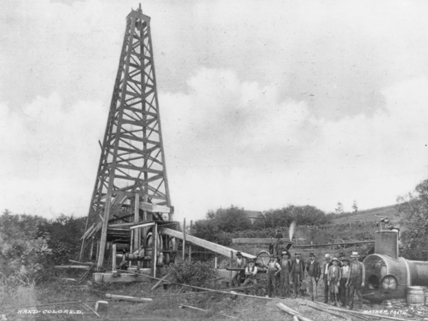Edwin Drake’s oil rig at Titusville, Pennsylvania, circa 1859
Oil and natural gas production in the United States is the highest it has been in two decades. For the first time in generations, the nation is poised to free itself from dependence on imported oil. At least that is what many forecasters are saying. The industry that was born in the United States and that drove the nation’s rise as a global power is making a historic comeback.
The United States is still the largest consumer of oil, but it once was the world’s leading producer. As early as 1909, total US oil production exceeded that produced in all the countries of the world combined. In the early 1800s the Industrial Revolution had led to a search for a cheaper and more convenient fuel than coal. In 1859 the town of Titusville, Pennsylvania, was the site of the first well that tapped oil at its source underground. Drilled by Edwin Drake, the well produced 25 barrels per day, a puny amount by today’s standards. Texas surpassed Pennsylvania in the early 1900s as the state producing the most oil, owing to the Spindletop discovery.
The formation of the Organization of Petroleum Exporting Countries (OPEC) in 1960 marked a shift in the global oil economy, and the wealth that goes with it—away from the United States. But the US oil industry is regaining significant clout. Vast reserves of oil and natural gas are being discovered and tapped in North America because of innovative technologies. Horizontal drilling and fracking (hydraulic fracturing) allow access to fossil fuel resources trapped deep within rock formations. The International Energy Agency (IEA) predicts that the United States will pass Russia as the largest non-OPEC producer by sometime in 2015—and overtake Saudi Arabia as the world leader by the end of the decade.
Image credit: © Library of Congress, Prints and Photographs Division
Related Links
- Power Shift: Energy Boom Dawning in America
Learn about the resurgence of the US oil and gas industry; includes an infographic on fracking, and an interactive map on locations of the boom.
(Source: NBC News, March 18, 2013) - U.S. Oil Boom Leaves OPEC Sidelined from Demand Growth
This article focuses on changes in the global oil economy brought on by the growth in US production; includes a chart comparing OPEC and non-OPEC countries, and a video interview with the director of the IEA.
(Source: Reuters, May 14, 2013) - Oil Industry
This historical overview of the oil industry in the United States stops short of the recent boom; see also Spindletop.
(Source: History.com; accessed May 31, 2013) - U.S. Field Production of Crude Oil
Data from the U.S. Energy Information Administration portray the rise and fall of US oil production from the 1860s to today; see also Countries for an interactive world map and the EIA’s figures from 2011 comparing oil production internationally.
(Source: EIA; accessed May 31, 2013)





I found oil in my backyard
were u live
I just hate ignorant posts that get serapd by other ignorant people.Here are a few key points:1. There is no medical cartel. The American Medical Association, the largest physician organization, represents fewer than one-fourth of all physicians. It has a lobbying group that has only modest influence on the government. (The Milton Friedman quote was from long ago, and it was wrong even then.)2. Medical licensure is controlled by each state, not the federal government. Almost no physician except those who committed felonies or many cases of malpractice is denied licenses.3. The numbers of medical schools and the size of their classes are not controlled by Joe and Jane practicing physicians. The numbers are controlled by the federal government. The class sizes are indirectly controlled by the federal government because the schools are dependent on federal funding, and the feds decide how many students they will support at each school. The federal government thinks we have too many physicians, not too few. It thinks that we should eliminate almost all specialists in favor of family practice doctors. The field of medicine is so vast that it is hard to keep up with a single subspecialty. The belief that care will be better with 600,000 Marcus Welbys is worse than naive. If the US believes that we need many more doctors, all the federal government has to do is help fund the expansion of our existing schools and the creation of new schools.4. We are experiencing a cyclical rise in medical school applications. So what. Most of the applicants are unqualified and/or unsuitable. Their advisors should have steered them into different careers.5. US doctors earn more than in other countries because the vast majority of our pre-med and medical students don’t get funding from the government. The average medical school graduate has accumulated over $120,000 in debt. She will spend the next 3-7 years as a low-paid resident or fellow, but will have to pay the interest on the loans throughout this training. When a doctor finishes training and joins a practice, she has no patients yet and no revenue stream. She has to acquire patients, pay student loans, and often pay a buy-in fee to the group. Is she supposed to do all this on $75,000 a year?Never has an article on Carpe Diem angered me as much as this one. Greg Mankiew obviously didn’t talk with physicians and medical educators. He just took some raw facts on numbers of schools, numbers of students, and numbers of applicants and started screaming about a price-gouging medical cartel. Private note: I’m a pathologist who always had salaried positions and who still teaches medical school part-time. I know that there are plenty of greedy physicians. But, there are greedy people in every field (You should see the ridiculous home repair estimate I just got–the workers think they’re worth $75 an hour.).
I learned this in history
nobody cares what you found in your backyard. you probably didnt even find oil
wow thats cool